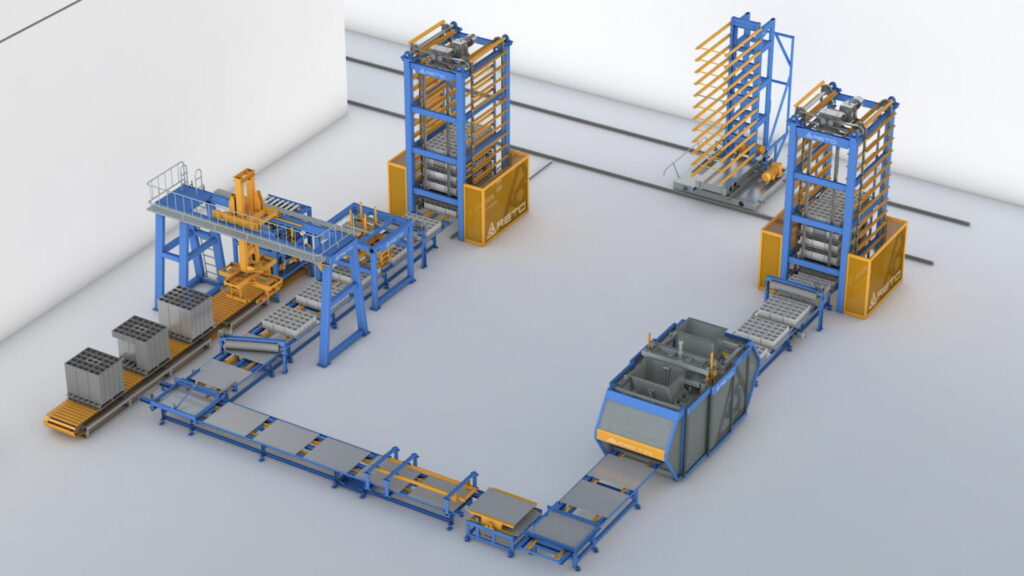
Elegir el derecho maquina para fabricar bloques de concreto a la venta Requiere una cuidadosa consideración de la capacidad de producción, tamaño y forma del bloque, calidad de material, nivel de automatización, requisitos de energía, y soporte de mantenimiento. Seleccionando una máquina adecuada y siguiendo prácticas de mantenimiento esenciales, Puede garantizar una producción eficiente y confiable de bloques de concreto para sus proyectos de construcción..
Factores a considerar al elegir una máquina de fabricación de bloques de concreto:
Capacidad de producción: Determine la capacidad de salida deseada de la máquina en función de los requisitos de su proyecto. Considere la cantidad de bloques que necesita producir por hora o día.
Tamaño y forma del bloque: Elija una máquina que pueda producir el tamaño y la forma específicos de los bloques que necesita. Los tamaños de bloques comunes incluyen bloques rectangulares estándar, bloques huecos, y bloques entrelazados.
Calidad de material: Evaluar la calidad de los materiales utilizados en la construcción de la máquina, como el marco, caja de moho, y sistema hidráulico. Los materiales duraderos aseguran la longevidad y la confiabilidad.
Nivel de automatización: Considere el nivel de automatización que desea. Las máquinas totalmente automáticas requieren una intervención humana mínima, Mientras que las máquinas semiautomáticas pueden requerir la carga manual y la descarga de materiales.
Requisitos de energía: Asegúrese de que los requisitos de energía de la máquina se alineen con su fuente de alimentación disponible. Considere factores como el voltaje, amperaje, y fase.
Mantenimiento y soporte: Elija una máquina que viene con las pautas de mantenimiento adecuadas y el soporte fácilmente disponible del fabricante o proveedor.
Tipos de máquinas para fabricar bloques de hormigón:
Máquinas de prensa hidráulica: Estas máquinas usan presión hidráulica para comprimir la mezcla de concreto en moldes, producir bloques de alta densidad y duraderos.
Máquinas de vibración: Las máquinas de vibración utilizan tecnología de vibración para compactar la mezcla de concreto, resultando en bloques uniformes y de superficie lisa.
Máquinas de extrusión: Las máquinas de extrusión extruyen continuamente la mezcla de concreto a través de un troquel, Creación de bloques largos que luego se cortan en las longitudes deseadas.
Máquinas manuales y semiautomáticas: Las máquinas manuales requieren un esfuerzo humano significativo, mientras que las máquinas semiautomáticas ofrecen un equilibrio entre la mano de obra manual y la automatización.
Consejos de mantenimiento esencial para máquinas de fabricación de bloques de concreto:
Limpieza regular: Mantenga la máquina limpia eliminando cualquier residuo de concreto o escombros después de cada uso. Esto evita bloqueos y garantiza un funcionamiento sin problemas.
Lubricación: Siga las pautas del fabricante para las piezas móviles lubricantes para minimizar el desgaste.
Cuidado de moho: Inspeccione y limpie regularmente los moldes para garantizar la formación de bloque adecuada y evitar defectos.
Mantenimiento del sistema hidráulico: Para máquinas hidráulicas, Verifique el nivel de aceite hidráulico y la condición, y reemplácelo según el horario recomendado.
Controles eléctricos: Asegure las conexiones eléctricas adecuadas e inspeccione el cableado para cualquier daño o conexión suelta.
Inspecciones periódicas: Realizar inspecciones de rutina de la condición general de la máquina, incluyendo verificar cualquier signo de desgaste, daño, o desalineación.